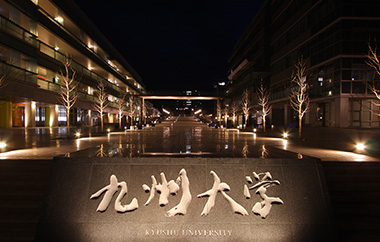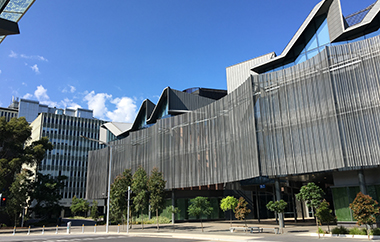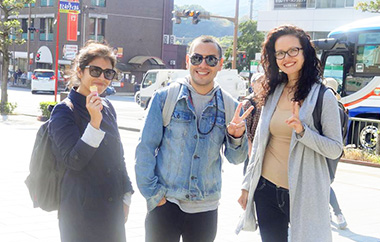海外から九州大学へStudy at
Kyushu University
大学院(国際コース)
International Graduate Programs
Our international graduate program was established in 2010 as a MEXT G30 graduate program of Kyushu University. Since then, we have observed growing interest from international applicants, and we currently offer the three English-taught programs:
- The International Program in Public Economics (IPPE)
- The International Program in Financial and Business Economics (IPFBE)
- The International Program in Management and Accounting (IPMA)
The Department of Economic Engineering provides IPPE and IPFBE, whereas the Department of Economic Systems administers IPMA. IPPE targets students who want to learn the latest economic theories and analyses of economic and public issues. It covers various important topics in modern society such as economic policy, public finance, industrial structure, labor relations, the environment, social welfare, and so on. IPPE also offers lessons on mathematical and computational analyses on these issues.
IPFBE and IPMA are suitable for students who want to study business-related issues. IPFBE focuses on financial and economic analyses of business issues, while IPMA mainly involves management and accounting studies. Students of IPFBE are required to take IPMA subjects, and vice versa, to achieve a multidisciplinary understanding of business issues. IPFBE and IPMA students also have the privilege to take classes at Kyushu University Business School (QBS).
IPPE, IPFBE, and IPMA offer a doctoral program as well as a master’s program.
Alumni Message
From Alumni of our Master’s Program
Huong Do
From Vietnam, graduated September 2020
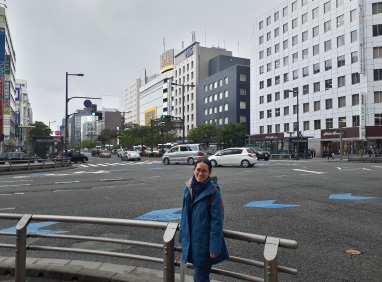
I loved Kyushu University as a student, and I now look back very fondly on my time there. I had several wonderful professors who inspired me with their knowledge. What I gained from the course was not only limited to what was stated in the curriculum but also included other intangible lessons. Professors were frequently invited from outside the university to give talks about their research, which enabled me to update my understanding of other research fields and to ascertain whether any of the topics suited my interest. More importantly, I could learn step-by-step from their experience regarding how to solve problems and how to formulate and answer questions logically. The analytical and problem-solving skills I gained proved to be great assets for my future development both academically and personally. My professor spent substantial time with me, especially when I was writing my thesis, and I learned a great deal from his seminars, ideas, well-rounded advice and eye for detail. The master’s course is academically challenging, but it has equipped me with confidence in research on topics related to my current job.
I could not have asked for more supportive faculty staff that I met at Kyudai. They were caring and helpful, encouraging me to consult them with any questions I had, not only as an international student but also as a foreigner in Japan, regarding how to deal with procedures and documentation issues, scholarship, housing, and language issues.
I was lucky to get to experience both the Ito and Hakozaki campuses. While the Hakozaki campus gave the impression of a classic atmosphere, the Ito campus was huge and modern, with photogenic corners and convenient, attractive libraries. I loved spending time in the student room or in the library studying or having a small meet-up with friends. Moreover, the Kyushu University Foreign Student Association (KUFSA) sometimes held sightseeing and experience trips to connect foreign students and to give us opportunities to visit famous destinations. Fukuoka is a lovely city with temperate weather, and I believe anyone who visits will love the location. Many famous destinations can be found in the city or nearby areas. Discovering Fukuoka and Kyushu island was a great memory and made me value my time at Kyudai even more.
Note: We call our university Kyudai. Kyu is abbreviation of Kyushu and Dai means university.
Bernard Njiri
From Kenya, graduated September 2017
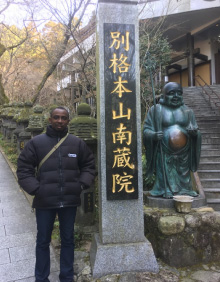
Identifying a university, course, and one or more potential supervisors to match your research interests is an important step when considering the possibility of undertaking postgraduate studies in Japan. After a long and rigorous selection process, I felt greatly honoured that Japan International Cooperation Agency (JICA) awarded me a master’s scholarship and Prof. Konari Uchida agreed to supervise me.
My study in Japan helped me to understand the real meaning of academia and extensive research. Twice a month, I presented a published journal article to my supervisor and other students in our research lab. During these presentations, I answered questions raised on the research questions, methodology, and findings of the article and the relevance of the article to my research topic. I also reviewed many relevant papers and attended classes and research workshops. Doing so built my confidence in my presentations and research skills and helped to shape my career aspirations. I would advise aspiring scholars that punctuality and hard work are necessary requirements for rewarding study in Japan.
At first, culture shock is inevitable, but a positive attitude helped me to blend into the Japanese community, and I came to love the new environment. There are many interesting aspects of Japan, including the unique culture, food such as sushi and nabe, activities like the Japanese tea-making ceremony and flower arrangement, fireworks (hanabi), cherry blossoms (sakura), Halloween, and Disney World, among others.
For those who are married and intend to invite spouses or other immediate family members, the process is smooth when applying for a Certificate of Eligibility at your nearest ward office as long as your application meets all the requirements. Japan has a child support system, daycare (hoikuen) with friendly teachers (sensei), and all the necessary facilities your children may require.
In summary, I would encourage prospective international students to pursue their plans to study in Japan and always remember these important words: Sumimasen (sorry), Gomennasai (apologize), and Arigato gozaimasu (thank you).
From Alumni of our Doctoral Program
Yong Huang
From China, graduated September 2016
Currently associate professor at Zhongnan University of Economics and Law
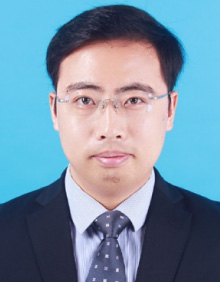
I graduated from Kyushu University with a PhD in economics in 2016. At present, I am an associate professor at the School of Accounting and Finance, Zhongnan University of Economics and Law. My four-year venture in Kyudai makes one of the most unforgettable parts of my life. Even though I have been gone for several years, I still have a vivid memory of the anxiety I felt when I first landed in Fukuoka Airport, the sleepless nights I spent reading and writing papers, and the excitement of receiving my diploma. As a former student of Kyudai, I really enjoyed the school’s tranquility, which kept me away from the hustle and bustle of the city and enabled me to focus on my studies. As a professional researcher, I am especially grateful to Kyudai for equipping me with the ability and skill to venture into academia. Without the rigorous training I received there, I would not have been able to succeed in academic research. As a graduate, I hope more and more students will go into the world from Kyudai and change the world in a Kyudai style.
Wei Wang
From China, graduated September 2017
Currently assistant professor at Shanghai University of Engineering Science
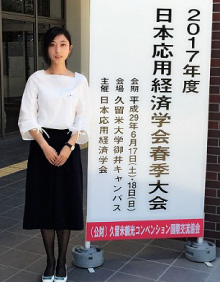
Looking back, I recall my five-year life abroad during my master’s and doctoral programs as being like a short dream. I can recall the scenes when I left Shanghai on September 26, 2012 and arrived at Fukuoka Airport as if it were yesterday. Although I wanted to enjoy my life in Japan, I began with a series of trial and error. I was filled with mixed feelings: a comforting sense of relief that I had managed to start my life abroad and, simultaneously, the anxiety of leaving my family for the first time and the confusion of adapting to a new environment. In those days, I did not understand Japanese at all. However, the streets were beautiful, the public transportation was very convenient, and Japanese people were polite and well-mannered. The advanced technologies and traditional culture were integrated well, and I was impressed by all the wonders of Japanese society.
In October 2012, I entered the Graduate School of Economics, Kyushu University (International course). While mainly studying economics in the Department of Economic Engineering, I came to be interested in studying Japan’s social security in greater depth. I decided to pursue a doctoral degree in October 2014. I enjoyed numerous opportunities to meet different people at Kyushu University. Fortunately, I succeeded in devoting myself to my studies while also leading my life abroad in a healthy and comfortable manner.
I was sometimes almost overwhelmed by the many difficulties I had to overcome without my parents’ help. However, every time I overcame a problem, I felt my strength and self-confidence increase.
Although it is important to be valued by others, it is even more important to grow to value oneself. In these five years, I was able to experience many things that became treasured memories, including devotion to my studies, certification, and trips. It might be said that life is a kind of pilgrimage during which people can find themselves. If so, then I am sure that my “adventure” in Japan is a great source of wealth to me. If you study abroad, you will have endless chances to enjoy your academic life. I want young students to be confident of what they have already learned and to spend each day with a clear vision of what they want to do in mind. I sincerely hope you will spend many fulfilling days at Kyushu University!



